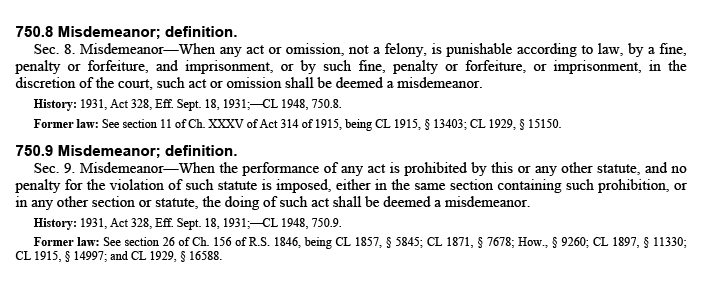






-

-
-
Maggie GeorgeRated by Super Lawyers
loading ...
Michigan Criminal Defense Lawyers
As Michigan criminal defense attorneys with over a decade of trial experience, we understand that everyone’s goal is to stay out of jail and protect their future. This often requires highly skilled legal counsel because Michigan is very tough on certain offenses. This is particularly true within the Metro-Detroit area.
For example, if you’re convicted of a DUI, or possession of a controlled substance, you may receive jail time even for a first offense. There are many other criminal offenses such as domestic violence, theft offenses, and white-collar crimes that the police and courts will prosecute vigorously. As a result, hiring the right attorney can be a life changing decision.
George Law is Lead Counsel Certified and recognized as experts in criminal defense. Our law firm was recently rated as Best Criminal Defense Attorneys in Detroit. We have the knowledge, experience, and expertise to keep you out of jail and protect your future.
Criminal Defense Areas
The criminal defense attorneys at George Law have over a decade of trial experience and represent clients through a variety of legal issues. This includes both misdemeanor and felony offenses in the State of Michigan. Common areas we successfully defend clients in include but are not limited to the following:
- DUI & OWI Arrests
- Driver’s License Restoration
- Drug Related Offenses
- Domestic Violence Charges
- Sexual Assault Charges
- Criminal Sexual Offenses
- Assault and Violent Crimes
- Juvenile Offenses
- Theft & Property Crimes
- Federal White Collar Crimes
Michigan Misdemeanors Laws

Misdemeanors are crimes that are considered less serious than felonies but more serious than civil infractions (tickets). Under Michigan Law, there are three types of misdemeanors with varying punishments.
- Misdemeanors punishable up to 93 days in jail
- Misdemeanors punishable up to one year in jail
- High Court Misdemeanors punishable up to two years in prison
The classification and penalties for Misdemeanor offenses in Michigan are outlined in The Michigan Legislature Section 750.81. Because they are not felonies, many individuals do not take misdemeanors as seriously as they should. This is an unfortunate mistake, as a misdemeanor conviction can have serious consequences for current and future employment, as well as barring individuals from participating in certain activities. It is vital for those facing misdemeanor charges to enlist the assistance of an experienced criminal defense attorney to ensure they receive the best outcome possible in their case.
Michigan Felony Laws

Felonies in Michigan are considered as serious crimes, carrying a minimum prison sentence of one year. Chapter 750 of Michigan Penal Code defines felonies into eight different types, ranging in from Class A to Class H. These range in seriousness from a potential life sentence for a Class A felony conviction to possible probation or alternative punishment for a Class H. The length of the sentence is usually dependent on the circumstances surrounding the crime and the sentencing judge. Below is a list of felonies and their corresponding maximum sentences, as well as examples of the type of crime that falls within each class.
Class A – Punishable by any number of years in prison, including up to life. Examples of this would include first and second degree murder, kidnapping and assault with a deadly weapon.
Class B – Punishable by up to twenty years in prison. Examples of a Class B felony include crimes such as second-degree arson and second-degree child abuse.
Class C – Punishable by up to fifteen years in prison. Manslaughter, human trafficking resulting in injury and robbery are all common examples of a Class C felony.
Class D – Punishable by up to fifteen years in prison. Common examples of a Class D felony include larceny of $20,000 or more, embezzlement and human trafficking.
Class E – Punishable by up to five years in prison. Home invasions, carrying of a firearm or dangerous weapon with unlawful intent, as well as first degree retail fraud are all typical Class E felonies.
Class F – Punishable by up to four years in prison. This covers offenses such as the manufacture, delivery or possession with intent to deliver a quantity of less than 5 kilos of marijuana, as well as unauthorized credit and loan applications.
Class G – Punishable by up to two years in prison. Common examples of this class of felony include offenses such as knowingly writing a bad check in an amount over $500, as well as a lobbyist giving gifts and certain types of domestic assault.
Class H – Punishable by possible jail time, however there is the possibility of alternative punishment such as probation, treatment or electronic monitoring as laid out in the Michigan Sentencing Guidelines
Juvenile Defense And Minors
Criminal cases involving minors are considered special in Michigan’s legal system and are treated accordingly. These cases involve a juvenile under 18 years of age when they violated a criminal statute. The purpose of this is to ensure that a juvenile does not have an unnecessarily harsh sentence or charge that can cause them undue hardship when they become adults.
The process by which these charges are filed is slightly more complex than how an adult would be charged, and requires the review of a prosecutor before the decision is made to take the charges to court. If the prosecution makes the decision to go forward with the charges, they will issue a delinquency petition to be filed with the Circuit Court’s Family Division. This initiates the court proceedings and notifies all parties that the juvenile in question is delinquent and is being formally charged with the offenses listed in the petition.
After the case is filed, it is transferred to a specialized section of the family court, known as the juvenile court. This requires the in-person appearance of the charged juvenile in court for an initial hearing in front of a judge. There are several possible outcomes from these cases, which include case dismissal, proceeding with charges, alternative sentencing, juvenile diversion or even criminal court. The outcome is largely dependent on the circumstances surrounding the offense, as well as the offender’s age and any previous criminal history.
Drunk Driving Offenses
In the State of Michigan, DUI arrests are especially serious. If someone is convicted of drunk driving, the offender may receive up to 93 days in jail even for a first offense. Although receiving jail time on a first-offense OWI is not typical, it’s not unheard of especially in the absence of a specialized DUI attorney fighting the case. The courts are given discretion in first time sentencing, and certain judges are well known for assigning jail time for even first offenders.
Michigan has a lengthy and detailed series of charges for various drunk driving violations, with a consistent increase in punishment and sentencing for repeat offenses. There is even a category covering high BAC offenders (over 0.17%), known as Michigan’s “Super Drunk” law. Repeat offenders and those whose offenses resulted in serious bodily injury or death have the possibility of facing felony OWI charges instead of a regular misdemeanor OWI charge.
Criminal Record Expungements
Removing a conviction from your public criminal record in Michigan is a difficult task. Criminal record expungements are only available to individuals who have been convicted of no more than one crime in their lifetime. In order to have a conviction removed from public record, eligible individuals must file an application to set aside conviction(s) with the court in which they received the conviction.
Filing this application is an involved process which requires fingerprinting and specific documentation, as well as a fee paid to the State of Michigan. In addition, any interested parties must be notified, such as the prosecutor who handled your case as well as the law enforcement agency involved. After this has been completed, the individual will be brought in front of a judge, who will determine whether the conviction should be set aside based on the arguments presented.
This process is similar but slightly more complex when dealing with juvenile convictions. When a minor is convicted of a crime, it is known as adjudication. When a person wants to expunge a conviction they received as a minor, this is typically referred to as setting aside an adjudication, which means that individual no longer is required to disclose the previous conviction to employers. It should be noted that regardless of whether the expunged record is that of a minor or an adult, that law enforcement will always have the ability to access a person’s previous criminal history – there is no way to completely wipe a record clean.
Why Hire George Law for Your Criminal Defense Lawyer?
Facing criminal charges is one of the most serious situations an individual will find themselves in, with the potential for life-altering consequences. For this reason, it is vital that defendants choose the best possible legal defense. An attorney specializing in criminal law will be able to take the facts of your case and use them to mount an effective defense. When combined with extensive experience in the court system and a good working relationship with court staff and judges, the right criminal defense lawyer can be the difference between freedom and facing prison and extensive fines.
At George Law, we pride ourselves on our experience and track record of success in ensuring the best possible legal outcomes for our clients. When you hire our team of expert attorneys, you will have our decades of legal experience on your side backed up with countless numbers of cases won and charges dismissed. Our award-winning criminal defense firm is highly regarded in the Greater Detroit Area, with a well-earned reputation for achieving positive outcomes in cases and outstanding courtroom performance.
Criminal Defense Certifications And Expertise
Lead Counsel Verified – George Law is Lead Counsel Verified for both Criminal Defense as well as Drunk Driving since 2020 and 2016 respectively. Lead Counsel is a certification that helps consumers and businesses ensure that the attorneys they hire have the highest level of skills, expertise and professionalism based on a thorough and strict verification process.
Best Criminal Defense Attorneys in Detroit – George Law was the top law firm featured on Expertise.com for 2021 Best Criminal Defense Attorneys in Detroit based on professionalism, reputation, and many other factors determined by a strict review process.
Best DUI Lawyers in Detroit – George Law was the top law firm featured on Expertise.com for 2021 Best DUI Lawyers in Detroit based on professionalism, reputation, and many other factors determined by a strict review process.
Talk With an Experienced Michigan Criminal Defense Attorney
The criminal justice system in the United States was developed to be fair and just. Unfortunately, however, no system is perfect. Like any other system, the criminal justice system is run by people who make errors and simple human mistakes, have bias, and may even have malicious intent. Because of this, it is essential to properly defend oneself in the event that they are suspected of or charged with an offense. This requires an in-depth knowledge of the laws and legal processes of the state, with a good working relationship with prosecutors, judges, and the court system.
The criminal defense attorneys at George Law have decades of combined experience working in Michigan’s court system and successfully defending clients in criminal cases. Our team will sit down with you to discuss and analyze your particular situation, and formulate a specific winning legal strategy to ensure the best possible legal outcome. If you are facing criminal charges and are in need of the best possible legal defense, please contact us today to make the first right step in protecting your freedom and your future.
Criminal Defense Practice Areas
- Criminal Defense
- Sex Crimes
- Drug Charges
- Misdemeanor Offenses
- Domestic Violence
- Michigan Gun Law & Firearm Laws
- Rules for Transporting Firearms in Michigan
- Manufacture, Sale, Or Possession Of Illegal Weapons
- Carrying A Firearm Or Weapon With Unlawful Intent – MCL 750.226
- Possession Of A Firearm By A Felon In Michigan – MCL Section 750.224f Copy
- Carrying Certain Concealed Weapons In Michigan – MCL Section 750.227
- Possession Of A Firearm During A Felony – MCL 750.227b
- Pointing Or Aiming A Firearm At Another Person – MCL 750.233
- Homicide
- Juvenile Offenses
- Criminal Record Expungements in Michigan
- School Offenses
- White Collar Crime
- Violent Crimes
- Embezzlement
- Theft Crimes
- Michigan Felony Defense Lawyers
- Internet Crime / Cyber Crime
- Federal Crimes
- Probation Violations
- Traffic
- The Criminal Process in Michigan
Contact Details
Contact Us
Office Locations
- OFFICE ADDRESS
444 South Washington Avenue
Royal Oak, MI 48067
248-470-4300 - AVAILABLE 24/7
Call/Text My Cell: 248-470-4300
Fax: 248-381-8894
FREE Case Evaluation
To talk to an attorney today, call 248-470-4300,
or fill out our contact form

 Menu
Menu